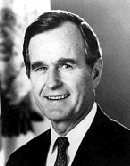George Herbert Walker Bush

George Herbert Walker Bush
Birthplace: Milton, Mass.
George Herbert Walker Bush was born June 12, 1924, in Milton, Mass., to Prescott and Dorothy Bush. The family later moved to Connecticut. The youth studied at the elite Phillips Academy in Andover, Mass.
The future president joined the Navy after war broke out and at 18 became the Navy's youngest commissioned pilot, serving from 1942 to 1945, and was awarded the Distinguished Flying Cross. He fought the Japanese on 58 missions and was shot down once.
After the war, Bush earned an economics degree and a Phi Beta Kappa key in two and a half years at Yale University.
In 1945 Bush married Barbara Pierce of Rye, N.Y., daughter of a magazine publisher. With his bride, Bush moved to Texas instead of entering his father's investment banking business. There he founded his oil company and by 1980 reported an estimated wealth of $1.4 million.
Throughout his whole career, Bush had the backing of an established family, headed by his father, Prescott Bush, who was elected to the Senate from Connecticut in 1952. The family helped the young patrician become established in his early business ventures, a rich uncle raising most of the capital required for founding the oil company.
In the 1960s, Bush won two contests for a Texas Republican seat in the House of Representatives, but lost two bids for a Senate seat. After Bush's second race for the Senate, President Nixon appointed him U.S. delegate to the United Nations and he later became Republican National Committee chairman. He headed the U.S. liaison office in Beijing before becoming Director of Central Intelligence. In 1980 Bush became Reagan's running mate despite earlier criticism of Reagan “voodoo economics” and by the 1984 election had won acclaim for his devotion to Reagan's conservative agenda.
The vice president entered the 1988 presidential campaign and easily defeated Democrat Michael Dukakis. Bush's choice of Sen. Dan Quayle of Indiana as a running mate provoked criticism and ridicule that continued even after the administration was in office. Nonetheless Bush strongly defended his choice. George Herbert Walker Bush became president on Jan. 20, 1989, with his theme harmony and conciliation after the often-turbulent Reagan years.
Bush's early Cabinet choices reflected a pragmatic desire for an efficient, nonideological government. And with his usual cautious instinct, in 1990 he nominated to the Supreme Court the scholarly David H. Souter, with broadly conservative views.
In his first year, Bush was confronted with the Lebanese hostage crisis, the Exxon Valdez oil spill in Alaska, and the ongoing war against drug trafficking. His public approval soared following the invasion of Panama in late 1989. But a staggering budget deficit and the savings and loan crisis caused the president's popularity to dip sharply in his second year. This plunge followed Bush's recantation of his campaign “no new taxes” pledge as he sat down with congressional leaders to tame the budget deficit and deal with a faltering economy.
In 1991, the president emerged as the leader of an international coalition of Western democracies, Japan, and even some Arab states that came together to free Kuwait following an invasion of the country by Iraq in Aug. 1990. The coalition forces defeated Iraq in only a little more than a month after Operation Desert Storm was launched on Jan. 16–17, 1991, and a nation grateful at feeling the end of the “Vietnam syndrome” gave the president an 89% approval rating. However, the high rating fell as the year went on, as doubts persisted about the war's outcome—Iraqi president Saddam Hussein remained in power and persistently avoided complying with the terms of the peace treaty—and as concerns began to grow about the faltering U.S. economy and other domestic problems.
A major Bush accomplishment in 1991 was the Strategic Arms Reduction Treaty (START), signed in July with Soviet president Mikhail S. Gorbachev at their fourth summit conference, marking the end of the long weapons buildup.
In the 1992 presidential election, Bush was defeated by Gov. Bill Clinton of Arkansas.
The Bushes have four sons, George, Jeb, Neil, and Marvin, and a daughter, Dorothy. Another daughter, Robin, died at age three from leukemia. Son George served as governor of Texas from 1995 to 2000, when he was elected the 43rd U.S. president. Jeb Bush was elected governor of Florida in 1998.
See also Encyclopedia: George Herbert Walker Bush.
| Ronald Wilson Reagan | Biographies of the Presidents | William Jefferson Clinton |







